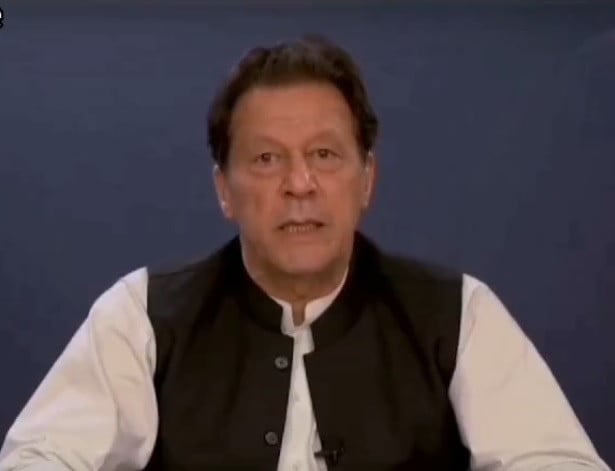Imran’s ‘arbitrary arrest’ against civil rights: UN panel
ISLAMABAD:
A United Nations human rights working group has requested the government to release PTI founding chairman Imran Khan, declaring that the deprivation of liberty of the ex-premier was in contravention of the universal human rights as well as international civil and political rights and is “arbitrary”.
The opinion issued on Monday by the Geneva-based UN Working Group on Arbitrary Detention was adopted at its 99th session, which was held from March 18 to 27.
In its report, which is based on the communication from a source and devoid of the government’s response, the UN body considered that taking into account all the circumstances of the case, “the appropriate remedy would be to release Mr Khan immediately and accord him an enforceable right to compensation and other reparations, in accordance with international law.”
The working group has also requested the government to take the steps necessary to remedy the situation of the ex-PM without delay and bring it into conformity with the relevant international norms, including those set out in the Universal Declaration of Human Rights and the International Covenant on Civil and Political Rights.
In addition, the working group urged the government to ensure a full and independent investigation of the circumstances surrounding the arbitrary deprivation of liberty of Imran and to take appropriate measures against those responsible for the violation of his rights.
It further requested the government to bring its laws into conformity with the recommendations made in the present opinion and with the commitments made by Pakistan under international human rights law.
The UN body while relying on the source’s information has incorporated details about several cases of the PTI founder, how he was arrested and put behind bars, how his party leaders were compelled to resign from their positions in the wake of May 9 events, how his trial was speeded up behind closed doors of Adiala Jail in cases such Toshakhana, cypher, Iddat or unlawful marriage in its report.
It has reproduced all the information provided by the source in its 17-page advanced edited version. The source has not just presented the whole political situation of pre and post-elections but also provided detailed information about legal cases, detention and how he was not given adequate time and prepare his defence.
“In his roles as Prime Minister and Chairman of the Pakistan Tehreek-e-Insaf,” the source told the working group, “Mr Khan has been an outspoken critic of corruption and has also spoken out about the dangers of the unconstitutional overreach of power in the military.”
“The Working Group has held in its jurisprudence that the right to a fair trial is violated when a government denies the defendant adequate time and facilities for the preparation of a defence,” the report said after the source informed the working group how different cases were hurriedly conducted.
“Cognisant of Mr Khan’s age of 71 years,” the concluding remarks read, “the Working Group recalls its deliberation No. 11, noting that States should refrain from holding individuals older than 60 years of age in places of deprivation of liberty, as they face a heightened risk to their physical and mental integrity and life.”
The report stated that the working group is also gravely concerned about the alleged arrest and disappearance of Mr Khan’s close colleague. It urges the appropriate authorities to act on the complaint filed on his behalf.
It said that it is alarmed by the general allegations of widespread arrests, detentions and disappearances of individuals, including many supporters of PTI, and urges the authorities to take swift and appropriate action in that regard.
Moreover, the working group said that it would welcome the opportunity to undertake a country visit to Pakistan to work constructively with the authorities in addressing its concerns in relation to arbitrary deprivation of liberty.
Surprisingly, the report says that the working group had made a request to the government on June 11, 2018, to conduct a country visit. It didn’t elaborate further.
Response from government
On November 7, 2023, the report said, the working group transmitted the allegations from the source to the government of Pakistan under its regular communications procedure, requesting to provide detailed information by January 8, 2024, about the current situation of Mr Khan.
The working group also requested the government to clarify the legal provisions justifying his detention, as well as its compatibility with the state’s obligations under international human rights law and, in particular, with regard to the treaties ratified by the state.
Moreover, it said, the working group called upon the government to ensure Mr Khan’s physical and mental integrity. The group regrets that it did not receive a response from the government to the present communication.
Opinion without govt response
In determining whether the detention of Mr Khan is arbitrary, the report read, the working group has regard to the principles established in its jurisprudence to deal with evidentiary issues.
If the source has presented a prima facie case for breach of international law constituting arbitrary detention, it read, the burden of proof should be understood to rest upon the government if it wishes to refute the allegations.
In the present case, it added, the government has chosen not to challenge the prima facie credible allegations made by the source.
Mandate
The working group has the mandate to investigate cases of deprivation of liberty imposed arbitrarily or otherwise inconsistently with the relevant international standards outlined in the Universal Declaration of Human Rights or in the relevant international legal instruments accepted by the states concerned.
This includes, inter alia, seeking and receiving information from governments, inter-governmental and non-governmental organisations, as well as receiving information from the individuals concerned, their families or their representatives.

